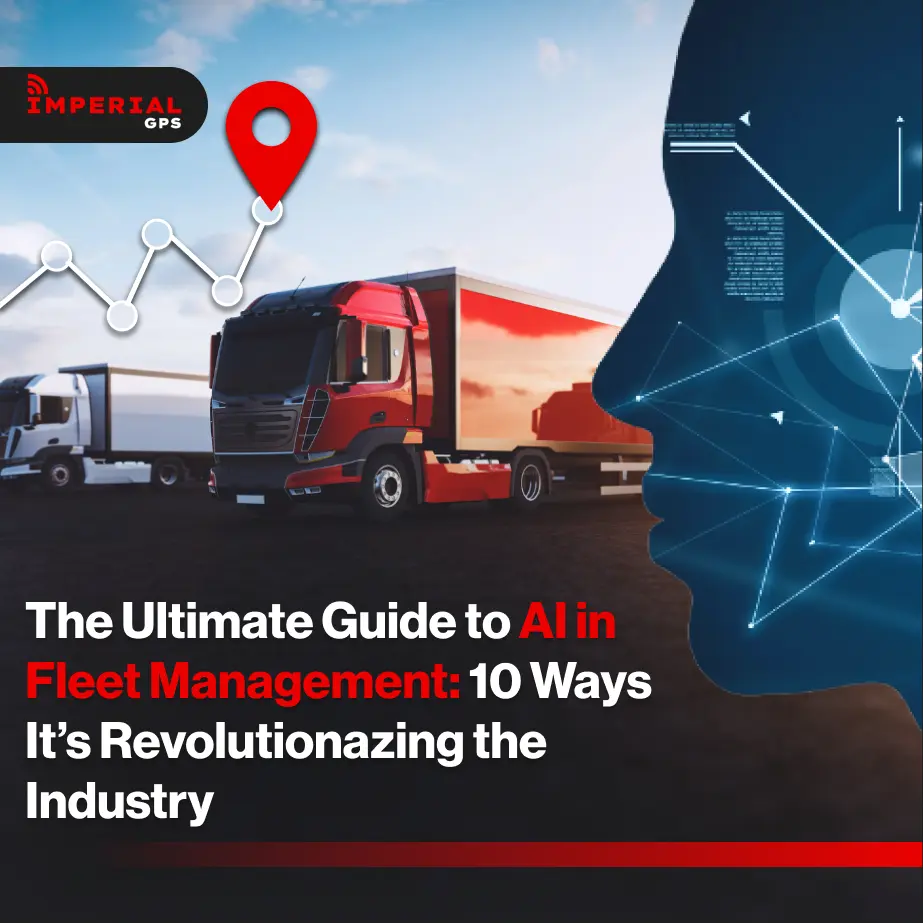The Ultimate Guide to AI in Fleet Management: 10 Ways It’s Revolutionizing the Industry

Businesses and government organizations are always looking for ways to streamline their operations and boost profitability. Introduction of Artificial Intelligence in fleet management has been a breakthrough advancement in this pursuit. This development has revolutionized fleet management. It has boosted operations, improved safety and ensured compliance. Let’s look at exactly how AI is driving fleet management.
1. Predictive Maintenance
AI is able to predict maintenance needs before a vehicle breaks down. AI assesses vehicle data to estimate when maintenance is due. This helps avoid expensive repairs and minimizes interruptions of vehicle operations. With timely servicing, businesses can prolong the life of their vehicles and save on unforeseen maintenance costs.
2. Enhancing Driver Safety
With AI, businesses can track driver actions in real-time. AI technology identifies risky behavior and immediately transmits alerts and feedback. Constant driving monitoring reduces the incidence of repeated accidents and promotes responsible driving. Companies can benefit from lower insurance rates and an overall safer fleet.
3. Real-Time Vehicle Tracking
With AI-powered telematics systems, companies can get live updates on individual vehicles in the fleet. Live location and status tracking enables managers to make data-driven decisions regarding routing, fuel consumption and service provision. This leads to efficient fleet management.
4. Improved Compliance Solutions
Staying compliant with industry rules and regulations is a requirement for fleet operations. This used to be difficult, but AI has made it much simpler. Smart ELDs (Electronic Logging Devices) uses AI technology to monitor driving hours, automate log entries and produce required compliance reports. This mitigates the risk of non-compliance and automates the reporting process.
5. Optimized Route Planning
AI systems leverage live traffic data to present optimized routes. By adopting efficient routes, fleets can save fuel and reduce operational costs. Opting for efficient routes is also the environmental-friendly option as carbon emissions are reduced.
6. Fuel Management
AI systems also boost fuel management. By assessing elements such as driving behavior and route selection, AI helps optimize fuel usage. UPS and DHL have enjoyed substantial reductions in fuel usage post AI integration in their fleet management processes.
7. Automation of Reporting
AI automates the generation of compliance and performance reports. This boosts accuracy in reports and substantially saves time as compared to manual reporting. This automation is key in keeping records up-to-date for compliance and performance reviews.
8. Adapting to Changing Conditions
AI can process a large amount of data in a significantly short time. This capability is key in helping fleets adjust their routes to unexpected circumstances like road closures, traffic congestion, and weather changes. The live data analysis enables fleet managers to make quick calls to ensure the continuity of fleet operations.
9. Cost Savings
The aggregate impact of AI integration with fleet management is significant reduction in operational costs. AI integration drives substantial efficiency gains in fleet management, contributing to a boost in overall financial standing.
10. Future Trends and Innovations
This is not it for AI in fleet management! AI technology is expected to continue to become more advanced. The future of AI in fleet management will introduce the world to self-driving vehicles, advanced machine learning and sophisticated real-time predictive analysis. All these breakthroughs will boost efficiency, safety and sustainability even further.
Real-World Success Stories
Let’s look at some real-world success stories where AI integration with fleet management has produced great results.
UPS
With the integration of AI, UPS has significantly improved delivery routes planning, reduced fuel consumption and increased delivery speed.
DHL
DHL has benefitted from an improvement in maintenance schedules. This has made their operations less vulnerable to disruptions due to vehicle breakdowns.
City of Los Angeles
The city of Los Angeles has adopted AI technology to manage the municipal fleet. They have reported a boost in operational efficiency and substantial reduction in costs.
Overcoming Challenges
Integrating AI in fleet management has a lot of benefits. However, to successfully incorporate AI in fleet operations, organizations have to overcome some challenges. These include, technological hurdles, financial investments and organizational acceptance. Only by successfully addressing these challenges, could AI be effectively incorporated into the system. Once companies overcome these challenges, they will find themselves in a strong position to reap maximum advantages of AI in fleet management.
Conclusion
AI is revolutionizing the fleet industry. It offers unparalleled insights and efficiencies for fleet operations. Predictive maintenance, real-time tracking, optimized routing are only some of the many features of AI in fleet management. The many advantages and features of AI helps ensure safer, more efficient and cost-effective fleet operations. As AI continues to evolve and grow, its impact on the efficacy of fleet operations will also grow bigger. The evolution of AI in fleet management will open doors to lucrative opportunities for both businesses and municipalities.
Only by adopting AI in fleet management, could organizations remain competitive in this dynamic industry. Embracing AI is not merely a good business decision but a necessary move.
Imperial GPS
Looking to enhance your fleet operations with AI integration? Look no further! Imperial GPS leverages cutting-edge AI to enhance fleet safety, reliability, and performance. Contact us today for a free consultation and discover how AI can transform your fleet operations.
References
For further reading and detailed insights, refer to the following paper:
10.55434/CBI.2024.10103


